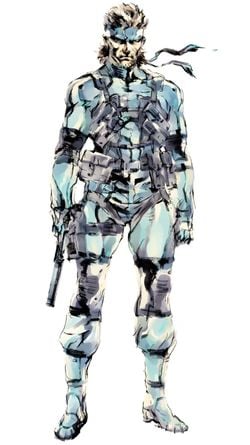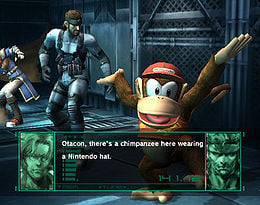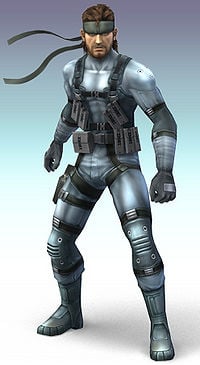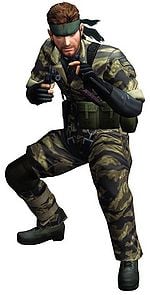Solid Snake
- For Snake's appearance in Super Smash Bros. Brawl, see Snake (SSBB).
| Solid Snake | |
|---|---|
 File:MetalGearSymbol.png Official artwork of Solid Snake from Metal Gear Solid 2: Sons of Liberty. | |
| Universe | Metal Gear |
| Debut | Metal Gear (1987) |
| Smash Bros. appearances | Brawl Ultimate |
| Most recent non-Smash appearance | Metal Gear Solid V: Ground Zeroes (Cameo, 2014) |
| Console/platform of origin | MSX2 |
| Species | Human |
| Gender | Male |
| Place of origin | Earth |
| Created by | Hideo Kojima |
| Designed by | Yoji Shinkawa (Metal Gear Solid series) Tsubasa Masao (Metal Gear Acid series) |
| Voice actor | David Hayter |
| Japanese voice actor | Akio Ōtsuka |
| Article on Wikipedia | Solid Snake |
Solid Snake, often simply referred to as Snake, (ソリッド・スネーク, Soriddo Sunēku) is the main protagonist of the Metal Gear series, created by Konami. Previously popularized as a character to serve as an antithesis to the cheery and colorful Nintendo-inspired characters that were prevalent in games near the end of the 1990s, Solid Snake has become the first third-party character confirmed to be a playable fighter in the Nintendo fighting game, Super Smash Bros. Brawl. He is also the only character from a series with M-Rated game entries to be featured in a Super Smash Bros. game.
Character description
Metal Gear franchise creator, Hideo Kojima, started off his franchise with the first Metal Gear for the MSX2 computer in 1987, as a pastiche of high-profile action movies at the time, such as Lethal Weapon and Escape from New York. Kojima's main character for the game, codenamed Solid Snake, was likewise inspired by the heroes from those action movies, such as Kyle Reese (played by Michael Biehn) from The Terminator, whom Snake's first portrait was based on. Snake's name, in fact, was derived from Escape from New York's main character, Snake Plissken (Kurt Russell). When Metal Gear was ported to the NES, it sold well enough that Snake subsequently appeared in the sequel, Metal Gear 2: Solid Snake. The character underwent an eight-year hiatus, until the release of the seminal Metal Gear Solid for Sony PlayStation in 1998, which fully established Solid Snake in his more popular, modern-day character design, which was made by artist, Yoji Shinkawa (see his above artwork). Shinkawa's Snake design features a dark grey bandanna, a consistent "sneaking suit", and the effective voicework of Akio Ohtsuka for Japanese versions and David Hayter for English versions of Metal Gear games as Snake's defining aspects.
In the Metal Gear series, the player assumes the role of Solid Snake (or a similar character depending on the game's scenario, like Raiden in portions of Metal Gear Solid 2 and Metal Gear Rising) as a special-ops agent and spy, tasked to disarm and/or destroy what is usually a new incarnation of the eponymous, bipedal, mechanized, nuclear-based superweapon, Metal Gear. He must always act alone initially in each mission, sneaking and battling his way through enemy compounds, armed with nearly nothing other than his two-way "codec" radio to receive transmissions from his commanding officer and other characters, a pair of binoculars, and as a bonus touch, a pack of cigarettes. His wits must always be sharp for him to rely on as he carries out sabotage-based assignments that seem immensely stacked against him in concept, and he must acquire his own firearms and rations and make use of environmental elements, such as cardboard boxes (one of Snake's borderline-comical trademarks) to advance his various objectives. No mission Snake has ever gone through can be considered routine; each of his missions in the Metal Gear games is rife with all manner of epic drama, intrigue, double-crossings, betrayals, and revelations with wide-ranging implications for everything and everyone in the series.
Snake's story begins as his father, codenamed Naked Snake, operates for the original FOX unit of the U.S. government at the height of the Cold War in Metal Gear Solid 3: Snake Eater. He is heavily influenced by his mission's revelations, where he finds out just how much he is a subject to the mechanisms of his government, so he splits away from the FOX unit and must deal with the revolt of his former FOX comrades in Metal Gear Solid: Portable Ops. Afterwards, he co-founds the FOXHOUND Elite Special Force with Roy Campbell and becomes its commanding officer, "Big Boss". In 1972, Big Boss is put into a coma and becomes part of a cloning project called "Les Enfants Terribles" to produce genetic clones of himself as his "sons". One of them would become the FOXHOUND operative codenamed Solid Snake, grown to resemble Big Boss almost identically.
In Metal Gear, Big Boss tasks the rookie, Solid Snake, to infiltrate the rogue nation, Outer Heaven, to sabotage its suspected Metal Gear weapon, but Snake finds out later that Big Boss is actually the leading man behind Outer Heaven, just like FOXHOUND, and Snake was deceived and set up by Big Boss to witness him using Metal Gear to establish Outer Heaven as a nuclear power, but Snake manages to sabotage the Metal Gear and defeat Big Boss. Roy Campbell takes Big Boss' place as commanding officer in FOXHOUND, and years later in Metal Gear 2: Solid Snake, Campbell assigns Snake to infiltrate a heavily fortified base in the nation, Zanzibar Land, which is also trying to become a nuclear power with the Metal Gear D model. Snake finds that the leading man behind this plot is Big Boss as well, and in a final confrontation with Metal Gear D, Snake kills Big Boss for good with a makeshift flamethrower. Both Solid Snake and Roy Campbell go into retirement after this.
In Metal Gear Solid, Snake is called out of retirement from Alaska by Campbell to battle FOXHOUND, which has now gone rogue and has seized the nuclear weapons facility at Shadow Moses Island, threatening the U.S. with a nuclear strike unless they acquire Big Boss' remains. Snake must infiltrate the island and defeat each rogue FOXHOUND member one-by-one, and he sabotages the Metal Gear REX model at Shadow Moses. Snake finds that the leading man behind this plot is an operative codenamed Liquid Snake, who is Solid Snake's genetic twin, and Solid Snake learns of his clone heritage. Solid survives while Liquid dies, and the mission is complete. Snake is called into service yet again in 2007 to infiltrate a tanker which gets sunk in Metal Gear Solid 2: Sons of Liberty's prologue sequence. It is during his infiltration of the tanker that he discovers that Liquid Snake "lived on" in Revolver Ocelot's recently transplanted arm (the arm that was transplanted was Liquid's). He survives and gets involved in the immensely intricate and complex scenarios that occur throughout the rest of the game in 2009. It is during these series of events that a third clone of Big Boss is revealed as Solidus Snake, who is a mixture of dominant and recessive genes, thus being considered a genetic bridge between the recessive Solid Snake and the dominant Liquid Snake. The PlayStation 3 game, Metal Gear Solid 4: Guns of the Patriots, features an aged Snake, now identified as Old Snake by the game. Advanced cellular degeneration caused by the cloning process used to create him has aged him prematurely. In the game, he wears a sneaking suit outfitted with "Octocamo" technology, which allows him to blend with his environment, as well as a face mask which alters his appearance (allowing the player to use his younger look during gameplay as well and disguise Snake as other characters). This new character design is based upon actor Lee Van Cleef. According to Ryan Payton of Konami, Guns of the Patriots will be the final canonical Metal Gear game to feature Solid Snake as the main character. Kojima himself has stated that the series will continue, but does not want the character to be handled by anyone else.
Solid Snake, in his less-aged incarnation, has made many non-canonical game appearances, perhaps even more times than in canonical Metal Gear games. In addition to several supplemental and enhanced titles that have accompanied the "main" games (including bonus skateboarding segments for Snake to partake in), Snake has appeared in several alternate reality Metal Gear games, including a Game Boy Color Metal Gear Solid, and in the card-based Metal Gear Ac!d series for PSP. Solid Snake has also appeared as a playable character in two fighting games involving characters from other franchises. The first is Hudson Soft's DreamMix TV World Fighters, involving characters from Konami, Hudson Soft (which was not yet a Konami subsidiary at the time) and toy maker Takara Tomy such as Bomberman, and Optimus Prime and Megatron from the Transformers franchise. The second is the Wii fighting game, Super Smash Bros. Brawl, alongside famous Nintendo characters such as Mario and Pikachu. His inclusion in the game generated an immense outburst across the game industry. Metal Gear Solid is also parodied in Ape Escape 3 for the PS2 in the minigame Mesal Gear Solid: Snake Escape, where Solid Snake has been captured and the player must control a monkey to rescue him.
In Super Smash Bros. Melee
A popular rumor claims that, during development of the Super Smash Bros. Melee, Metal Gear series creator Hideo Kojima wanted Masahiro Sakurai to include Snake in the game as a playable fighter; the rumour also claims that the addition was not viable because development of Melee was too far in. Indeed, Snake was not included as a playable character when Melee came out, but he was the first third-party character (the only other one being Sonic) confirmed to appear in Brawl.
In Super Smash Bros. Brawl
Snake makes his debut in the Smash series as a playable character in Brawl, announced via a surprise teaser shown after the first trailer for the game. Snake's appearance in the Smash series was unusual; prior to the announcement, no third-party characters had ever appeared in a Smash game. According to Hideo Kojima, he asked Nintendo to use Snake in Brawl, but was initially turned down, as Snake seemed too similar to a mascot for rival console maker Sony rather than Nintendo; Snake's last appearance on a Nintendo console was in 2003's The Twin Snakes, a Metal Gear Solid remake, while the then-unreleased fourth game in the series, Guns of the Patriots, was strongly speculated to be the killer app for the PlayStation 3. Kojima later asked Sakurai himself to add Snake; as the two were personal friends, Snake was added to the expanding roster of characters.
Attempting to recreate Snake's tactical method of fighting utilizing cunning and modern warfare in the Metal Gear games themselves, Snake enters the fray as a predominantly defensive strategic character with a high emphasis on set-ups and controlling the fight. Much of Snake's moves utilize firepower of some sort; in fact, all three of Snake's smash attacks use some sort of weapon rather than a hand to hand move, relegating his actual CQC (Close Quarters Combat) moves to his tilt moves and aerials. Further more, two out of three of these smash attacks are indirect in nature. Combined with his special moves of similar nature, such as planting a remote detonated C4 mine, and the deceptively high power of his hand to hand moves, Snake is perhaps one of the most unique characters in the game with his high emphasis on tactical fighting. Snake is also one of the heavier characters in the game in both speed and durability, although his impressive recovery ability thanks to his Cypher move and his fast tumble roll dash move can make him deceptively quick when the need arises.
Although Snake uses a large amount of explosive firepower, he has no traditional firearms, such as handguns and rifles, despite regularly making use of them in the Metal Gear games themselves. This is presumably due to Super Smash Bros. Brawl's emphasis on being friendly to almost all age groups, and thus the use of common guns would possibly raise the rating of the game. As is, many of Snake's current moves do have a real world counterpart, such as traditional Hand Grenades and the R.P.G. However, these are treated in a bit more of a comical and lighthearted fashion. Snake's character brings a high amount of Easter eggs and homages to his game series with him, from saying "Tasty" when eating food akin to Metal Gear Solid 3: Snake Eater, to his down throw, resembling the sleeper/neck breaker hold featured in all the Metal Gear Solid games to date, among other things. His rather unorthodox stealth tactic of hiding within a cardboard box also makes an appearance as Snake's taunt. Like Luigi's "kick" taunt, the cardboard box can deal damage. All of his taunts make Snake wear the cardboard box, but he uses a different way of putting it on for each of his three taunts. Snake can also call one of his affiliates via the Codec, much like in the Metal Gear games, as a secret taunt, only possible on the Shadow Moses Island stage. Each character, including Snake himself (if two or more players are using him), has a distinct conversation and the original voice actors for Solid Snake, Colonel Roy Campbell, Hal "Otacon" Emmerich, and Mei Ling reprise their roles. There's even one instance of a surprise guest appearing within the Codec while talking about Falco.
Because of his unique gameplay and overwhelming tournament dominance, Snake currently ranks 6th on the official tier list. His Smash appearance has also garnered criticism from casual and professional Smashers, as he has been dubbed one of the two most overpowered characters in the game (again, along with Meta Knight) mainly due to his fast, disjointed and powerful attacks which possess hitboxes that extend much further than the actual animation. Snake is also known as the Brawl equivalent of Fox's Melee incarnation, as he is known to have one of the highest learning curves due to his highly sophisticated playstyle and the fact that players must be aware of aspects such as knowing the right place to lay his explosives and making sure that he does not harm himself and, in the worst case scenario, committing suicide in the process.

Trophy Info
A former member of FOXHOUND with an IQ of 180 and mastery of six languages. He's an infiltration specialist whose ability to carry out missions under any conditions has made him a legend. He's saved the world three times from the threat of bipedal, nuclear-armed mechs called Metal Gear. Currently he's working with the anti-Metal Gear group known as Philanthropy.
Stickers
| Name | Game | Effect | Character(s) |
|---|---|---|---|
| Solid Snake | Metal Gear Solid: The Twin Snakes | ||
| Solid Snake | Metal Gear Solid 2: Sons of Liberty |
 Solid Snake (MGS The Twin Snakes) |
 Solid Snake (MGS2 Sons of Liberty) |
Similarity to Naked Snake
Due to the fact that Solid Snake is a clone and son of Naked Snake, there are definite similarities between the two. Naked Snake was the original "Snake," having been given the codename by Major Zero during the Cold War. During the Les Enfants Terribles project, Naked Snake (known as Big Boss by then because of his legendary exploits during and after Operation Snake Eater) had his genes stolen and three "sons" were eventually created: Solid Snake, Liquid Snake, and Solidus Snake. In Brawl, Snake's appearance can be said to be a hybrid between Solid and Naked Snake. Brawl's Solid Snake is similar to Naked Snake in appearance in several ways:
- His beard is a full beard, which resembles Naked Snake's beard more than Solid Snake's stubble.
- His bandana's green color resembles The Boss's bandana, which Naked Snake wore.
- Several of his alternate costumes feature camouflage exclusive to Metal Gear Solid 3.
- His C4 is sometimes shaped like a butterfly, which is another reference to Metal Gear Solid 3.
However, keep in mind that these are only similarities. There is no doubt that the Snake in Brawl is meant to be Solid Snake. Not only is he referred to as Solid Snake many times in official documents, but his support team of Otacon, Mei Ling, and Colonel Campbell as well as much of his moveset and costumes points clearly in that direction.
Trivia
- Solid Snake himself wears a teal-colored bandanna. It is Naked Snake, also known as Big Boss, who wore the dark green bandanna that Snake is seen wearing in Brawl. However, the Bandanna item in Metal Gear Solid and Metal Gear Solid 2 (which gives Snake infinite ammo) is also dark green. They might have let Snake wear that bandanna to explain why he has infinite ammo during battle. It would not be the first time such an explanation is used in the Metal Gear universe.[1]
- Brawl is the second time Solid Snake and Yoshi have appeared in the same game; the first being when a Yoshi doll appears in The Twin Snakes in Otacon's lab. Yoshi would later appear in the 3DS port of Metal Gear Solid 3 wherein Yoshi dolls replace the Kerotan frog banks dotted around the game's areas.
- Snake is the only third party character to never have been a starter character.
- The Ice Climbers and Snake are the only characters from single-character universes to get cut.
- Snake is also the only Brawl veteran to not appear in SSB4 as a trophy, and the first and only third-party character to be dropped from the series altogether.
- He was however, mentioned in the Nintendo Direct on October 23, 2014 during the Palutena's Guidance segment.
- Snake is also the only Brawl veteran to not appear in SSB4 as a trophy, and the first and only third-party character to be dropped from the series altogether.
|
| |
|---|---|
| Fighter | Snake (SSBB · SSBU) |
| Assist Trophy | Gray Fox |
| Stage | Shadow Moses Island |
| Item | Cardboard box |
| Other | Colonel Roy Campbell · Mei Ling · Otacon |
| Trophies, Stickers and Spirits | Trophies · Stickers · Spirits |
| Music | Brawl · Ultimate |

